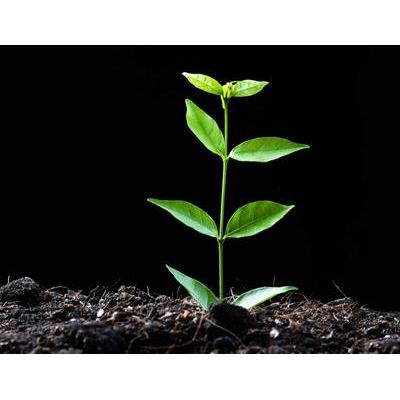


Activated Carbon for Biochar – Natural Soil Improvement - Soil and Groundwater
The number of plant coal producers and products has increased considerably in recent years. The offer is large, so are the differences in quality. The European Biochar Certificate (EBC) offers reliable quality standards. As a voluntary Europe-wide industry standard, the certificate guarantees an environmentally friendly manufacturing process and pollutant-free premium product quality. Since 2012, plant coal producers have been able to have their products certified by this independent inspection body and are monitored regularly. A large number of our customers and users of PYREG technology are EBC-certified, and only high-quality biochar is in demand on the market at profitable prices. You can find out more about the EBC certificate here.
Biochar is highly porous and has a surface area of up to 300 square metres per gram. It can therefore absorb up to five times its own weight of water and the nutrients dissolved therein (Source: SCHEUB/PIEPLOW/SCHMIDT, Terra Preta, 2015).
Untreated biochar does not yet have a soil-improving effect. It must first be “charged” with nutrients and colonised by microorganisms. The “charging” of the biochar can be achieved by various processes such as composting.
- Improved storage capacity for water and nutrients.
- Lower nutrient and thus also nitrate leaching into groundwater.
- Stable plant growth with lower crop failures.
- Activation of soil life. Microorganisms find ideal habitat.
- Less climate-damaging emissions such as nitrous oxide or ammonia.
- Active climate protection: The carbon bound in the coal is stored in the soil for centuries.
As a result, trees in particular have a significantly shorter lifespan and higher maintenance costs, and an ever-increasing percentage of new plantings do not survive the first year. Therefore, attempts are generally made to stimulate the growth of urban trees through synthetic fertilizers. In view of negative consequences such as greenhouse gas emissions, acidification, salinisation and losses of soil carbon, more and more cities are looking for alternative strategies.
Some large cities such as Stockholm (Sweden) or forestry enterprises in Quebec (Canada) have therefore switched to planting their trees in mixed substrates with biochar. Biochar is not only much more porous than sand or clay, it is also not biodegraded or compacted as quickly as peat, for example. The high porosity of biochar increases gas exchange and water storage capacity and ensures enhanced root penetration thanks to its high permeability.
